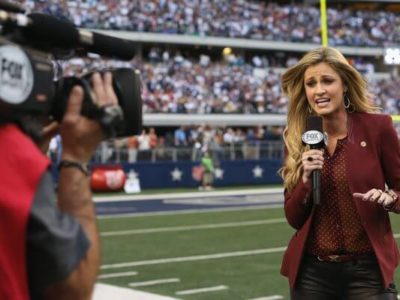The allure of the hustle and bustle of deadlines, the possibility of travel and the ever exciting and emotional environment of sports threw me onto the hot track of a career path from a young age. When I discovered my lack of athleticism, I knew sports media would be the second-best alternative, and now as a sophomore in college it is the only option.
My innate love for sports and obnoxious obsession with all things Rob Gronkowski and Boston stems from the roots my father planted in the upbringing of his four children. Summers were spent making signs to motivate the Red Sox (because they definitely knew we existed) from our sports sanctuary in Pennsylvania, while winters were filled with insane superstitions. During the 2007 season, my brother never stopped knocking on wood, while my father never failed to serve his lucky (so we thought) steak nachos.
Looking back on my childhood, I barely remember my own sports triumphs and failures, but instead I recall my first Red Sox game. During a hot July day in 2004 observing Camden Yards from behind home plate, I annoyingly screamed and cheered at an oblivious David Ortiz. The moment he turned to a star-struck younger version of myself and nonchalantly waved with two burly fingers still resonates with me. Even the experiences that motivated tears of anger make me more of a sports enthusiast because of my ability to feel the heartache of the players, like Johnny Damon (my first celebrity crush) being traded to the Yankees or the 2006 AFC Championship game between the New England Patriots and Indianapolis Colts.
Growing up, my passion and love for sports grew, which was often questioned and scrutinized because of my dramatics and my gender. My reactions to events like Big Papi’s grand slam in the 2013 ALCS and Malcolm Butler’s interception in Super Bowl XLIX (I have videos on YouTube if you are so inclined for a good laugh) joyfully express the connection and enthrallment to that specific moment.
While my reactions may raise a question that lacks understanding, my gender and knowledge of the sport should not. All throughout high school I found myself raising my voice and overly using hand gestures to get my point across about the latest sports topic because the males found it hard to believe a female could provide insightful thoughts and information to a conversation about anything having to do with a ball, bat or stick.
Once college rolled around I looked forward to the vast opportunities of Penn State, and even more so finding acceptance and commonality with my passions. This past year as a freshman, I joined two incredible radio stations and their sports departments. I was stoked to finally be in an environment with individuals who understood my zealous attitude about making sports broadcasting a career. While my experiences with both stations were overall productive and supportive of my career path, I also faced eye-opening challenges that I failed to acknowledge still existed.
The lack of seriousness associated with female sports broadcasters threw me for a loop and created a number of obstacles along the way. Males clearly dominated each station and the industry as a whole. Even with the men that share the same support for the Patriots, Red Sox, Celtics and Bruins, I found it hard to discuss pertinent matters because of their unwillingness to hear my predictions and thoughts. I have even been in a number of instances where my male counterparts have questioned me, as if it were an exam, about the teams I follow. Do they question the other males or their superiors? No, because they do not have long hair, boobs and a vagina.
While some male readers may be questioning my own knowledge of the game, I will concede to the idea that I do not know every little detail about sports. While I am conscious of how my sports knowledge needs to grow, I am also fully aware of the dark undertow motivating sexism in the sports world. Friends and even TV personnel have commented on the challenge women face trying to infiltrate the sports broadcasting world.
Before even dipping my toe in the broadcasting water at Penn State, I was informed of the male dominance and superiority complexes through the older females. Katie Nolan, an up-and-coming female influence in sports journalism, and Bill Simmons, a ruthlessly honest and respected male figure in media, discussed the role of women in sports media at an even bigger scale on Nolan’s podcast Garbage Time: “I read the Ramona Shelburne piece yesterday…I really like Ramona Shelburne…I don’t understand why they geared it around the female part of it. She’s just good at her job, but why isn’t that the story?” said Simmons. His concerns coincide with the idea that women are being applauded in the sports world for their gender and looks, instead of their overall production.
While my first year at Penn State exposed me to incredible experiences and events at the hands of many fellow students, especially at both radio stations, I also found myself at the hands of stereotypes and stigmas within a world I grew up idolizing. At times the prejudices pushed me to question my path in sports broadcasting, but trailblazers like Pam Oliver, Hannah Storm, Doris Burke and Molly Quirm motivate me to remember the inspiring moments, the sound of “Sweet Caroline” echoing throughout Fenway Park and the force that has connected me to these influential women, my family and a world bigger than sports itself.



















